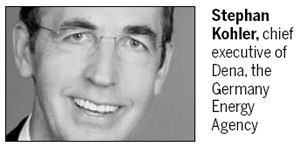School has lessons to teach on energy efficiency
Updated: 2013-06-29 07:42
By Cecily Liu (China Daily)
|
|||||||||||
German know-how brought in to help area devastated by quake
A school with about 3,000 students in the small city of Mianyang, Sichuan province, has become host to some of the world's most energy-efficient construction technologies.
 |
The Mianyang Experimental Primary School has installed solar panels, double-glazed windows, soundproof doors, energy-efficient cooling and lighting, and many other technologies that ensure students' comfort using minimal energy.
The seeds of the school's adoption of this cutting-edge technology were sown five years ago when the school was badly damaged by the Sichuan earthquake that killed about 70,000 people. In the reconstruction efforts, the school managed to achieve Germany's energy saving building standard with support from Dena, the German energy agency.
Dena, founded in 2000, specializes in energy efficiency technologies, with the German government and several German banks as its shareholders.
Stephan Kohler, chief executive of Dena, said the school is one of several pilot projects Dena worked on to share German energy-efficient building expertise with China, to help the country achieve its energy saving and environmental protection goals.
"The efficiency standards tested in Germany can be applied in China, and make an important contribution to reaching the national energy saving and climate protection goals," Kohler said. "If the tests are successful, the standards are to become part of Chinese legislation.
"German planners and engineers have many years of experience in energy-efficient construction. This is why China is looking to Germany as a role model when it comes to increasing energy efficiency in buildings."
Accelerating energy consumption and the associated emission levels have been serious concerns as China has continued to urbanize.
China's building sector now accounts for about 25 percent of the country's primary energy use, which is hardly surprising considering China transformed from a largely rural country to one with more than half its population living in cities within the space of 30 years.
Fortunately, energy-efficient construction techniques can result in significant energy savings. As Germany's building standards are globally renowned for energy efficiency, China's Ministry of Housing and Urban-Rural Development has worked extensively with Dena over the past few years to see if Germany's building standards and technologies could work in China.
"The market for energy efficiency developing in China is enormous," Kohler said. "That creates attractive cooperation opportunities for German companies in particular. German efficiency standards for new buildings and refurbishments are among the highest in the world."
As a testimonial to Germany's expertise, insulation and heat protection technologies have allowed Mianyang Experimental Primary School's buildings to have a heat protection capacity a third higher than the national standard. This translates into an energy consumption requirement 37 percent lower than the national standard.
The school project is a part of the German foreign office's Eight Schools for Sichuan initiative, in which the region's schools destroyed by the earthquake are being rebuilt with the help of German.
Another project Dena worked on in partnership with the Chinese ministry is Zai Shui Yi Fang, an apartment block in Qinhuangdao, a port city in Hebei province, whose construction is expected to be completed in October.
The apartment block is built to Germany's passive building standard, which is expected to reduce heating demand by 75 percent compared with the average in China.
Originally developed through several research projects in Germany in the late 1980s, passive design is a new building method that significantly lowers energy use of buildings through techniques such as solar panels, super-insulation, advanced window technology, air-tightness and space heating.
The 18-story building is heavily insulated, with an outer layer that makes it waterproof. The interior walls that separate the living area from the balcony are also well insulated to minimize energy loss.
All the floors, except the ground floor above the basement, are made up of concrete slabs, with an additional sound barrier. Double-glazed windows are used in the units, and all the doors that open to exterior hallways are specially sealed for air tightness.
Kohler said quality assurance for the project was jointly carried out by German experts and the Center for Science and Technology of Construction, a department of the Chinese Ministry of Housing and Urban-Rural Development.
This process included seminars with planners and building owners, reviews of the various planning stages and quality controls on the building sites.
Also, Dena has been keen to share its expertise with China through seminars and conferences, such as the annual Green Building Conference in Beijing. In 2010, Dena organized City Dialogue, a conference during the Shanghai Expo on energy efficiency and sustainability in cities.
Looking to the future, Kohler said achieving building energy efficiency will be an important step to help China's urban residents live comfortable lives with as little energy consumption as possible.
"In the 12th Five-Year Plan (2011-15), the Chinese government has already specified ambitious goals to make the development as sustainable as possible. The key to this is the development of a resource-saving, energy-efficient, environmentally friendly and low-emission economy and society," Kohler said.
Related Stories
Technical standards for hydro, wind, thermal power, power transmission and new energy 2013-06-27 12:38
China to become global energy lab 2013-06-08 09:42
China to supervise renewable energy law implementation 2013-06-06 11:33
Beijing to have more clean-energy taxis 2013-06-05 01:52
Chinese program shares wind energy technology 2013-06-05 00:36
China to further promote energy sustainability: official 2013-05-30 09:55
Today's Top News
Premier Li: Target for growth can be met
Prudent monetary policy to stay
Looted relics return to China
Li: Pragmatic co-op with ROK should deepen
China rejects US claims on Xinjiang
Premier promotes creation of FTA with EU
Industry to pay 15% more for natural gas
Forty years of music with China
Hot Topics
Lunar probe , China growth forecasts, Emission rules get tougher, China seen through 'colored lens', International board,
Editor's Picks

|

|

|

|

|

|





